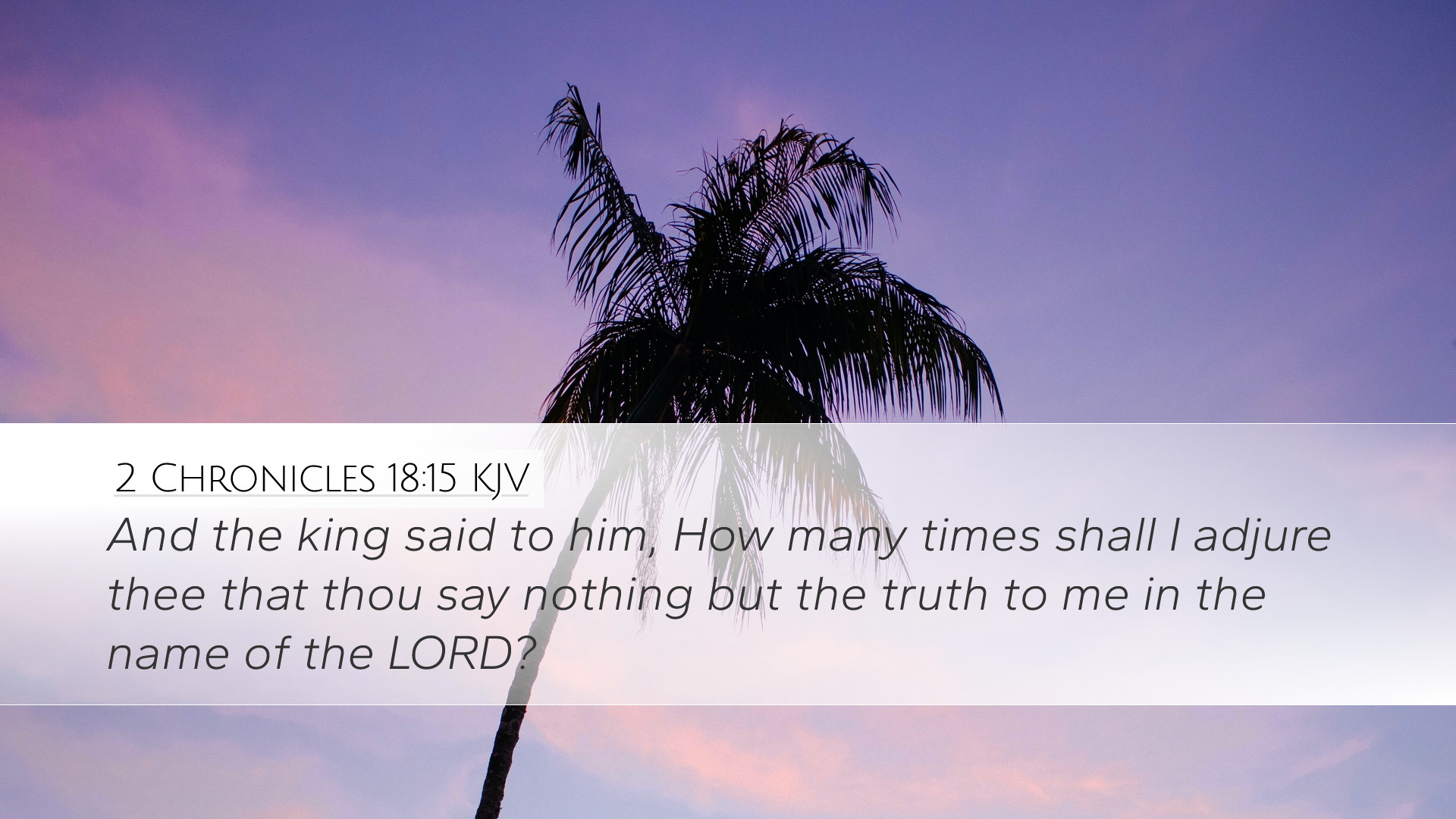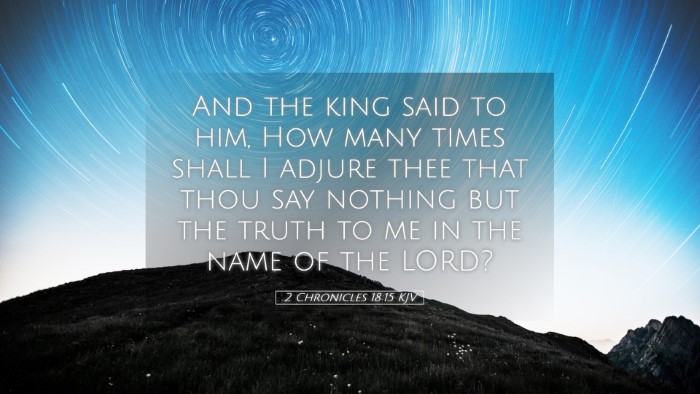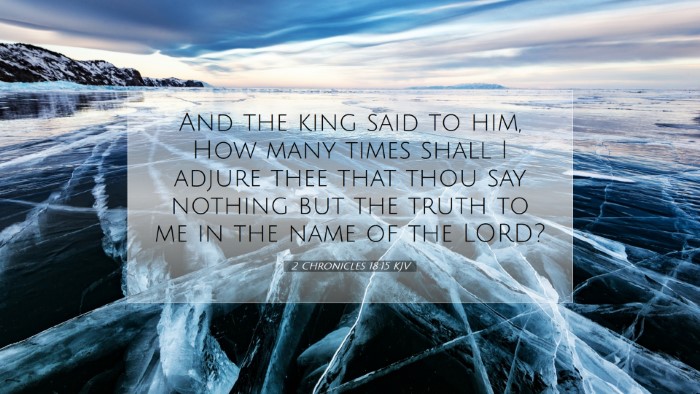Commentary on 2 Chronicles 18:15
Verse: "And the king said to him, 'How many times shall I make you swear that you speak to me nothing but the truth in the name of the LORD?'"
Introduction
This verse in 2 Chronicles 18:15 captures a pivotal moment in the narrative of King Jehoshaphat and King Ahab. It reflects the tension between divine truth and human inclination, a recurring theme in biblical history. The context of this verse emphasizes the importance of truthful prophecy and the responsibility of leaders to seek the Lord's counsel.
Contextual Analysis
In the chapter leading up to this verse, King Ahab of Israel sought the counsel of Jehoshaphat, king of Judah, to join him in battle against Ramoth-gilead. Jehoshaphat urged Ahab to inquire of the Lord. Ahab called upon 400 prophets, who all unanimously prophesied victory, which reflects a political and social pressure to conform to the wishes of the ruling king.
Jehoshaphat, discerning the inauthenticity of these prophets, insisted on hearing a true prophet of the Lord. This brings us to 2 Chronicles 18:15, where Ahab's response indicates a subtle tension. It highlights Ahab's awareness of the conflict between God's truth and the flattering messages from false prophets.
The Kings and Their Contexts
- King Ahab: Known for his idolatry and alliance with pagan worship, Ahab's leadership often steered Israel away from the true worship of Yahweh.
- King Jehoshaphat: Contrastingly, Jehoshaphat was recognized for his efforts to reform worship in Judah and sought righteous leadership.
The Dynamics of False Prophecy
A correlation arises between the social and political climate of Israel and the prevalence of false prophecy. Matthew Henry notes the foolishness of seeking consensus among prophets who only serve their own interests. The prophets' fatal flaw was their inability to provide the light of God's truth, thus leading Ahab into a false sense of security.
The Significance of Truth
The demand from Ahab for Micaiah, the true prophet, to "speak nothing but the truth" underscores a profound dilemma faced by leaders throughout biblical history. Albert Barnes explains that true prophets often faced intimidation and scrutiny, for speaking the truth could risk their lives in a hostile environment. This moment illustrates the often painful, yet necessary, responsibility of prophetic discourse.
Leadership and Accountability
Another significant aspect of this verse is its implications for leadership and accountability. Jehoshaphat's insistence on the truth invites pastors and leaders today to reflect on their role in guiding their congregations. Adam Clarke emphasizes that leaders should not merely seek validation of their decisions but should genuinely seek God's will.
The Role of the Prophet
The prophet's role is not just to deliver messages but to hold leaders accountable, challenging them to adhere to God's truth. Micaiah's impending confrontation with Ahab serves as a bitter reminder of the cost of fidelity to God. For theologians and students of the Bible, this moment delineates the necessity of discerning genuine prophetic voices amidst a cacophony of falsehoods.
Theological Implications
This verse brings forth profound theological reflections concerning the nature of truth, divine revelation, and the character of God. False prophets often arise from a heart that seeks affirmation over truth; thus, Ahab's request can be understood as a reluctance to accept divine sovereignty.
God's Sovereignty in Prophecy
2 Chronicles 18:15 reveals that despite Ahab's turmoil, God remains sovereign over the course of history. This is an eternal truth vital for scholars and pastors alike. God's will prevails regardless of human decisions. Scholars highlight that God's ultimate plan cannot be thwarted by human actions; it is, in fact, fulfilled through them—often in unexpected ways.
Application for Today's Church
For contemporary pastors and church leaders, this verse serves as a reminder to evaluate the sources of counsel and guidance within Christian communities. Are leaders surrounded by voices of truth, or are they echoing sentiments of popularity? Jehoshaphat's example invites a call for discernment in choosing the source of spiritual authority.
Encouragement for Faithfulness
Faithfulness to God's message can often lead to discomfort, yet it bears immense fruit in cultivating an atmosphere of genuine spirituality. This commentary encourages believers to embrace truth, even amidst opposition, affirming that God blesses those who uphold his justice and righteousness.
Conclusion
In conclusion, 2 Chronicles 18:15 serves as a vital scriptural reference that encapsulates the essence of seeking divine truth amidst a culture of compromise. Leaders, students, and theologians are implored to cultivate a steadfast commitment to God’s word and to challenge prevailing falsehoods. The profound inquiry posed by Ahab reflects not just a need for answers but also a desperate call for integrity in leadership.
Final Thoughts
The pursuit of God's truth requires both courage and consistency. As we reflect on this passage, may we be reminded of the solemn responsibility of communicating God's word faithfully, standing as voices of truth in a world filled with deceptive narratives.


